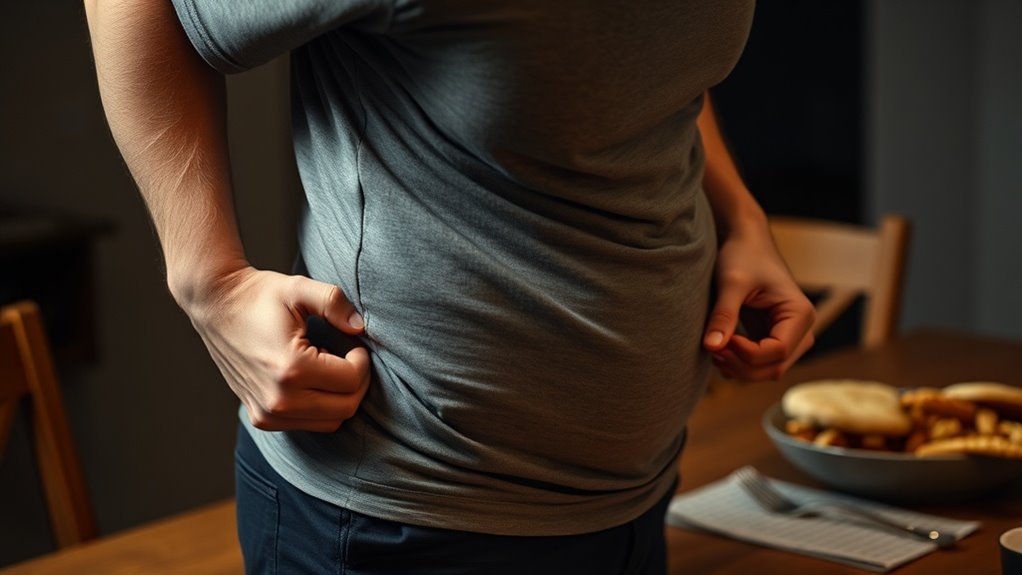Not Losing Weight. Poor Sleep Could Be the Reason!
If you’re struggling to lose weight despite sticking to your diet and exercise routine, poor sleep might be the hidden factor sabotaging your efforts. Sleep deprivation can throw your hormones out of balance, boost your appetite, and even slow down your metabolism. You may find yourself craving unhealthy snacks, especially late at night. Understanding the connection between sleep and weight management is crucial, and it might just change the way you approach your goals.
The Science Behind Sleep and Weight Gain
While you mightn’t realize it, the quality of your sleep plays a crucial role in your body’s weight regulation. When you skimp on sleep, your body can react in ways that lead to unwanted weight gain.
Sleep deprivation affects your appetite hormones, making you crave more sugary and fatty foods. You might find yourself reaching for that extra snack or dessert, feeling like you can’t resist.
Moreover, lack of sleep can slow down your metabolism, making it harder for your body to burn calories effectively. You may feel more sluggish and less motivated to exercise, further complicating your weight management efforts. This disruption in appetite-regulating hormones can intensify cravings and lead to overeating.
It’s important to understand that you’re not alone in this struggle; many people face similar challenges. Prioritizing good sleep isn’t just about feeling rested—it’s essential for maintaining a healthy weight and fostering a sense of well-being in your life.
Hormonal Imbalances Caused by Sleep Deprivation
Sleep deprivation disrupts the delicate balance of hormones that regulate your appetite and metabolism. When you skimp on sleep, levels of ghrelin, the hunger hormone, rise, making you feel hungrier.
Meanwhile, leptin, the hormone that signals fullness, drops, leaving you unsatisfied even after meals. This imbalance can lead to cravings for high-calorie foods, sabotaging your weight loss efforts.
You might also notice that stress hormones like cortisol increase with lack of sleep. Elevated cortisol can lead to fat storage, especially around your abdomen, which isn’t just frustrating but can also impact your health.
It’s crucial to recognize that these hormonal shifts aren’t just about weight—they affect your overall well-being. By prioritizing good sleep, you can support your body’s natural balance, helping you feel more energized and in control. Quality sleep is essential for regulating hunger-controlling hormones and maintaining a healthy metabolism.
Metabolism: How Lack of Sleep Affects Caloric Burn
Hormonal imbalances from sleep deprivation not only affect your appetite but also slow down your metabolism.
When you don’t get enough rest, your body struggles to regulate hormones like insulin and cortisol, which play crucial roles in metabolic function. This imbalance can lead to decreased caloric burn, making it harder for you to shed those extra pounds.
You might find that even with a balanced diet and regular exercise, your weight loss efforts stall.
This can be frustrating, especially when you’re trying to fit into that favorite outfit or keep up with friends. Additionally, adequate sleep is essential for regulating hunger-controlling hormones, which are vital for managing cravings and overall weight loss.
Eating Behaviors Linked to Poor Sleep Patterns
When you don’t get enough rest, your eating behaviors can take a hit, leading to choices that may sabotage your weight loss goals. Sleep deprivation often causes cravings for high-sugar and high-fat foods, making it harder to stick to healthy options. You might find yourself reaching for snacks that provide quick energy but lack nutritional value.
Here’s a quick look at how poor sleep influences your eating habits:
| Eating Behavior | Effect of Poor Sleep | Possible Alternatives |
|---|---|---|
| Increased cravings | More desire for junk food | Opt for fruits or nuts |
| Late-night snacking | Tendency to eat mindlessly | Set a cut-off time for eating |
| Skipping meals | Lower energy, leading to bingeing | Plan balanced meals ahead |
| Higher portion sizes | Loss of portion control | Measure servings |
| Emotional eating | Using food for comfort | Try journaling or meditation |
Recognizing these patterns can help you make better choices and support your weight loss journey! Additionally, practicing mindfulness techniques can aid in resisting cravings triggered by poor sleep and emotional states.
The Role of Stress and Sleep Quality in Weight Management
Stress plays a crucial role in determining your sleep quality, which in turn can impact your weight management efforts. When you’re stressed, your body produces cortisol, a hormone that can lead to weight gain, especially around your midsection. Poor sleep can exacerbate this, creating a vicious cycle.
-
Elevated cortisol levels can increase cravings for unhealthy foods.
-
Lack of sleep can disrupt your metabolism, making it harder to burn calories.
-
Stress often leads to emotional eating as a coping mechanism.
-
Poor sleep can reduce your energy levels, making you less likely to exercise.
Recognizing this connection is vital. You’re not alone in this struggle; many people experience similar challenges. Additionally, staying hydrated by drinking enough water can help curb hunger and reduce cravings, potentially aiding in your weight management efforts.
Tips for Improving Sleep Hygiene and Supporting Weight Loss
Improving your sleep hygiene can significantly support your weight loss journey. Start by establishing a consistent sleep schedule; going to bed and waking up at the same time helps regulate your body’s internal clock.
Create a calming pre-sleep routine—try reading a book or practicing relaxation techniques to signal your body it’s time to wind down.
Make your bedroom a sleep sanctuary: keep it cool, dark, and quiet. Limit screen time an hour before bed; the blue light from devices can interfere with melatonin production.
If you enjoy a caffeine boost, aim to cut it off in the early afternoon to avoid restless nights.
Lastly, don’t underestimate the power of community—share your sleep goals with friends or family. Supporting each other can make a world of difference in achieving restful nights and successful weight loss. Additionally, remember that quality sleep is essential for recovery and weight loss, so prioritize restful nights in your routine.
You’re not alone on this journey!





